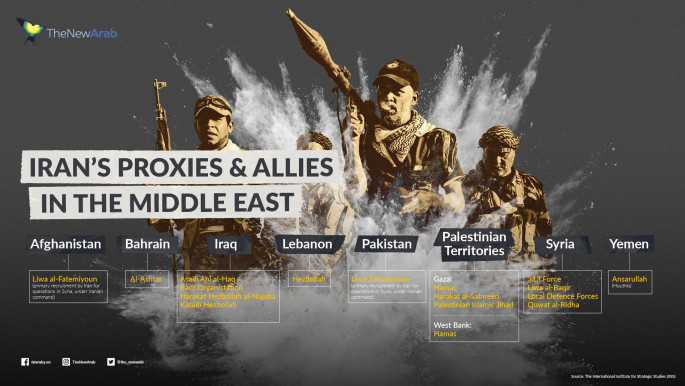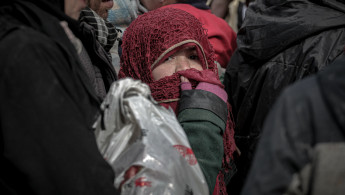Syria Weekly: Idlib at peace for now, after Russia-Turkey truce
Syria Weekly: Idlib at peace for now, after Russia-Turkey truce
After punishing Turkish strikes on Syrian regime positions forced a truce, Idlib has some respite. The question is, how long will it last?
6 min read
Syrians in Idlib will be saved from daily regime bombing for now [Getty]
A new ceasefire for the Idlib province was agreed between Turkey and Russia on Thursday, the latest in a series of shaky truces covering northwest Syria and one that follows a series of clashes that have put Moscow and Ankara on the brink of conflict.
After six hours of talks in Moscow, presidents Vladimir Putin and Recep Tayyip Erdogan hammered out an agreement to ease tensions between the two sides in Idlib province, which has seen a series of deadly clashes between Syrian regime and Turkish forces.
So far, the ceasefire has largely held and should, for now, halt the flow of refugees towards the Turkish border.
Critics in the Syrian opposition who oppose the deal say it rewards Russia and the Syrian regime for its infractions of the 2018 Sochi agreement, with Damascus gaining huge swathes of southern Idlib and west Aleppo from the opposition.
Critics in the Syrian opposition who oppose the deal say it rewards Russia and the Syrian regime for its infractions of the 2018 Sochi agreement, with Damascus gaining huge swathes of southern Idlib and west Aleppo from the opposition.
Realists say that Turkey had little choice but to agree to the terms of the new truce given the lack of support it has received from fellow NATO members following its face-off with Russia and the Assad regime in northwest Syria.
The deal also brings some relief for Syrians in Idlib province, who had suffered daily bombardment from Russian and regime aircraft and artillery.
The deal also brings some relief for Syrians in Idlib province, who had suffered daily bombardment from Russian and regime aircraft and artillery.
"In light of the escalation that [Idlib] witnessed in the last few months, the agreement can at least stop the massive displacement movement and can also give an opportunity to some people to go back to their hometowns, for those who came from towns north of the lines drawn by the agreement," Dima Moussa, vice-president of the Syrian National Coalition told The New Arab.
"If the agreement holds – and we do hope that it does – this can rectify some of the consequences of the escalation, though not all as many parts that were taken by the regime remain under its control."
Mass displacement
|
|
"If the agreement holds – and we do hope that it does – this can rectify some of the consequences of the escalation, though not all as many parts that were taken by the regime remain under its control."
Mass displacement
More than 1 million people were displaced by the Russian-backed Syrian regime offensive on Idlib and Aleppo provinces, which intensified in December. Nearly all headed towards the Turkish border where a humanitarian crisis has unfolded.
The brief ceasefire should provide NGO workers with a window to deal with the thousands of Syrians - particularly children - living by the sealed Turkey border and without shelter.
Erdogan has been under pressure from some opposition parties not to allow more Syrian refugees into Turkey and to avoid an escalation of the conflict with Russia.
Clashes between the Syrian regime and Turkey saw more than 60 Turkish soldiers killed in February and observation posts surrounded by the regime. Ankara's retaliatory strikes were much more punishing and a major incentive for the regime to halt its planned takeover of Idlib.
While pressure by Turkey has resulted in the cessation of hostilities for now, many analysts predict a resumption in the offensive once the Syrian regime re-builds its forces after suffering heavy blows from the Turkish military.
Moussa said that she hopes the new truce can be built on and be part of a longer-term peace for Idlib, particularly as Turkey has demonstrated that it can - and will - act to prevent the regime from capturing the whole of the province.
"While there is divergence in interests in Idlib between Turkey and Russia, the fact that an agreement was reached indicates that there is some convergence, and this can be the basis for holding and abiding by the agreement," Moussa said.
 |
"What we saw happening in the last few weeks leading to the agreement is indicative of Turkey's capability and ability to take action when necessary, and this in itself is an incentive to ensure that the agreement holds."
The Syrian National Coalition has called on all parties to support the agreement to prevent increased instability for neighbouring countries and stop the humanitarian crisis worsening.
"The international community needs to take note that on both the short-term and long-term, work on the diplomatic and political levels should focus on avoiding any more suffering for Syrians - in Idlib and elsewhere - and support this as a step closer to resolving this crisis and the conflict at large through a comprehensive political process by fully implementing UNSC resolution 2254," Moussa added.
Land grab
The new agreement will give the regime effective control of the M4 highway and the towns to the south of it. Russian and Turkish patrols will operate in these areas, but the Syrian regime will gain a key strategic and economic advantage by allowing the highway to operate, linking Aleppo and Damascus by road.
The mass displacement of Syrians during the regime advance and bombing has led some to accuse Russia of "weaponising" refugees, in a bid to pressure Turkey to accept the new frontiers of the de-escalation zone.
According to the 2018 Sochi agreement the ceasefire should cover the whole of Idlib but now effectively just entails the north of the province.
According to the 2018 Sochi agreement the ceasefire should cover the whole of Idlib but now effectively just entails the north of the province.
Despite the criticism levelled at Erdogan for the new agreement with Russia, Moussa said that without Turkish military pressure on the Syrian regime then the offensive might well have continued.
It was also the only route open to Turkey to end the ongoing humanitarian crisis, having been effectively abandoned by its NATO allies.
It was also the only route open to Turkey to end the ongoing humanitarian crisis, having been effectively abandoned by its NATO allies.
"It illustrated that Turkey - despite getting no military support from its NATO allies - is capable of taking on the regime and it will not stand around when there is a blatant breach of agreements, particularly when its posts are targeted," Moussa said.
Turkey's strikes and rebel counterattacks on regime positions are believed to have killed 2,400 soldiers and 1,900 Iran-linked militia fighters, while as many as 226 military vehicles were destroyed.
Some have criticised Turkey for not building on its devastating strikes on regime positions, something that could have led to a serious crisis in Damascus if high military losses contunued.
For now, the Assad regime has been forced to put its offensive on hold and thousands of Syrians will be saved from the devastating assault.
Yet after so many broken promises by Russia and the Syrian regime, the question is how long will the peace last.
Syria Weekly is a regular feature from The New Arab. To get Syria Weekly in your inbox each week, sign up here
Yet after so many broken promises by Russia and the Syrian regime, the question is how long will the peace last.
Syria Weekly is a regular feature from The New Arab. To get Syria Weekly in your inbox each week, sign up here
Paul McLoughlin is a news editor at The New Arab.
Follow him on Twitter: @PaullMcLoughlin



